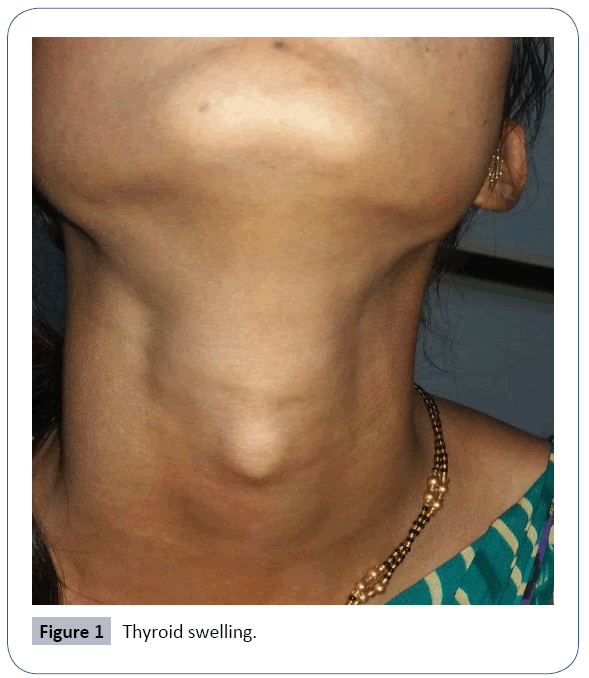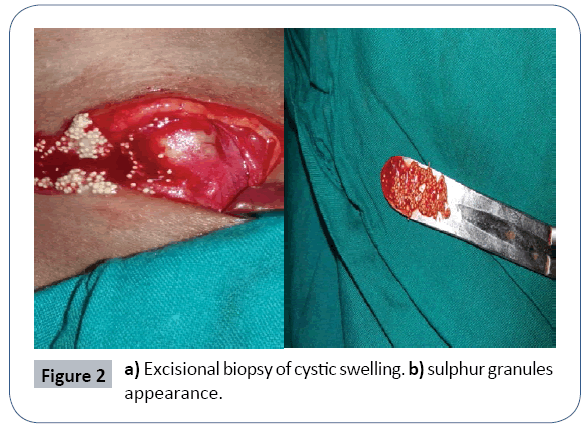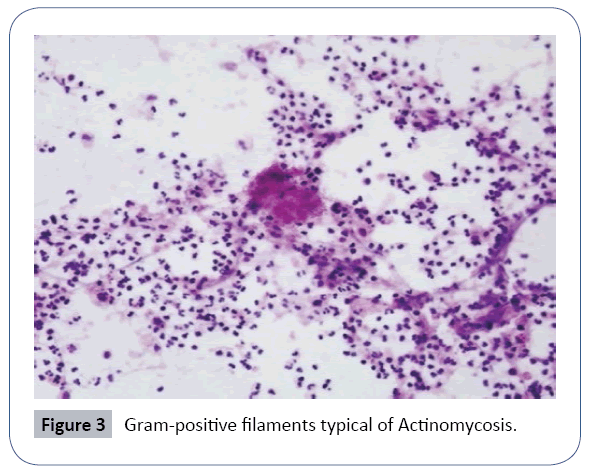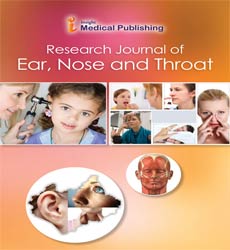Thyroid Swelling: Its Actinomycosis a Rare Coincidence
Chintale SG*, Kirdak VR, Jatale SP and Shaikh K
ENT Department, Jiius iimsr warudi tq. Badnapur dist. jalna, muhs nashik university, India
- Corresponding Author:
- Dr. Chintale sambhaji govind
ENT deptartment Jiius iimsr warudi tq badnapur Dist. Jalna
Maharashtra, India
Tel: +2348034656993
E-mail: drsamchinto@gmail.com
Received date: September 25, 2017; Accepted date: September 29, 2017; Published date: October 09, 2017
Citation: Chintale SG, Kirdak VR, Jatale SP Shaikh K (2017) Thyroid Swelling: Its Actinomycosis a Rare Coincidence. Res J Ear Nose Throat Vol.1 No.1:6
Abstract
A 30 years old female farmer by occupation presents with thyroid swelling since 6 months sought consultation in Ent OPD on examination swelling was soft cystic moves with deglutition but not with protrusion of tongue after routine work up for blood investigation excisional biopsy done and its histopathological reported suggestive of Actinomycosis.
Keywords
Thyroid; Actinomycosis; Abscess
Introduction
Thyroid swellings due to bacterial infections are uncommon and infection by Actinomycosis is even rarer. We describe here a case of thyroid enlargement due to Actinomycosis diagnosed on excisional biopsy histopathological report.
Case Report
A 30 year old female farm worker presented with a 6 months history of a thyroid swelling 2 cm × 2 cm in diameter (Figure 1).
The overlying skin was normal in appearance, on palpation swelling was soft cystic in consistency moves with deglutition but not on protrusion of tongue there was no palpable lymphadenopathy and she was euthyroid. Blood investigations showed hemoglobin 12 g/dl, total leukocyte count 5100/ cu.mm, T3, T4, TSH within normal limit and thyroid antibodies negative. Ultrasound examination of the neck showed a slightly cystic swelling over thyroid gland. Antibodies negative, chest X-ray normal. FNAC was suggestive of cystic lesion but for confirmation we planned to do excisional biopsy under local anesthesia and sedation (Figures 2a and 2b).
Histology and cytology showed colonies of branching Grampositive filaments typical of Actinomycosis (Figure 3).
With a small round cell infiltration. Ziehl-Nielson stain was negative. Bacteriological culture of this material was unsuccessful, and specimens from the mouth showed no evidence of Actinomycosis. Procaine penicillin 1.2 g/day was given intramuscularly for 4 weeks followed by phenoxymethylpenicillin 2 g/day, with probenecid 1 g/day by mouth, for a further 8 weeks.
There has been no evidence of recurrent infection during the 12 months of follow-up.
Description
Actinomycosis of the thyroid gland is an extremely rare condition with few documented cases [1]. Diagnosis on clinical grounds would have been difficult, but the slow progression, lack of pyrexia, the relatively painless induration and swelling, together with the normal white cell count and erythrocyte sedimentation rate, did not suggest a simple pyogenic bacterial infection. Thyroid function and isotope uptake remained normal, contrasting with previous reports in which reduced uptake in affected areas has been described [1-3]. Evidently in our case, clear cut abscess formation did not occur, despite the edematous appearance of the thyroid at ultrasound examination. A long natural history is characteristic of this infection, so it is possible that the first episode of thyroid swelling was also related to infection with actinomycosis.The precise strain of the organism remains Unknown, although thyroiditis following infection with Actinomycosis Israeli, bovis and naeslundi have all been described [3-5]. The portal of entry was probably the mouth, particularly with his dental neglect, and his farming occupation may also have contributed, although Actinomycosis is an unusual cause of infection even in this rural area .Actinomycotic thyroiditis has also been described in a child where transmission of the infection down the thyroglossal duct was suggested [5]. There was nothing to suggest this mechanism in the present case.
Conclusion
We as surgeon while examining the cases of thyroid swelling just have in mind that there may be possibility of Actinomycosis in thyroid swelling presentations just have proper treatment on it with great care.
Acknowledgement
This case is reported at our institute Jiius iimsr warudi tq badnapur dist. jalna thanks to our teachers and colleague for supporting this case report making.
References
- Blanc E, Jenny M (1974) Tyroiditei actinomycose. Schweizerische Medizinische Wochenschrift 31: 1094.
- Cobo CMJ, Lopez PB, Jimenez FP, Rubio FL, Pereptrez JAJ (1983) Actinomycosis tiroidea. Medicina Clinical 80: 93.
- Leers WD, Dussault J, Mullens JE, Volpe R (1969) Suppurative thyroiditis: An unusual case caused by Actinomyces naeslundi. Can Med Assoc J 101: 714.
- Volpl R (1978) The pathology of thyroiditis. Hum Pathol 9: 429.
- Zemen V, Smejkal V, Nahodil V (1980). Actinomycosis of thyroid gland in an 8 year old girl. Role of thyroglossal duct in pathogenesis Pediatrie 35: 224.
Open Access Journals
- Aquaculture & Veterinary Science
- Chemistry & Chemical Sciences
- Clinical Sciences
- Engineering
- General Science
- Genetics & Molecular Biology
- Health Care & Nursing
- Immunology & Microbiology
- Materials Science
- Mathematics & Physics
- Medical Sciences
- Neurology & Psychiatry
- Oncology & Cancer Science
- Pharmaceutical Sciences



